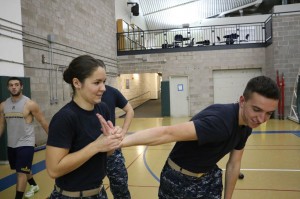Before the sun rises, sophomore Katelyn Murphy is already awake and active—lifting kettlebells and ammo cans, running sprints and doing push-ups. Some days, wake-up is even earlier: by 3:15 a.m. she’ll have her backpack ready to hike in the dark.
After returning to campus and attending a packed day of classes, Murphy will change back into athletic gear and head to Fauver Stadium for varsity track practice for more sprints and distance running.
Murphy, born in the Ukraine, is not only a Marine option in the Rochester Reserve Officer Training Corps (ROTC) but also a distance runner on the UR track and field team. She is just one of several students that participate in both ROTC and athletics at UR.
ROTC midshipmen are some of the earliest risers, hardest workers and most intensely trained individuals on campus. Not only do they balance physical training (PT) and extra early-morning classes as a part of ROTC several times a week, but these students also have to assure time to manage all of their regular school work. For athletes, there is an entirely other dimension added to their exhaustive, packed schedule.
“It’s definitely difficult to manage,” varsity soccer midfielder, midshipman and freshman Nicolette Kober said. “In season, it was actually so much easier to get my work done because I had literally no time to do anything except soccer, ROTC and study, whereas now, in the offseason and I do more things so I’m not working as much.”
When he was a freshman, senior Mackie Gage was also a member of the varsity track and field team, and like Kober, found it to be quite a strenuous commitment in combination with ROTC. After the fall, however, he decided not to continue with track, and switched to playing club rugby.
“It actually worked with my schedule more because practices were at night instead of in the afternoon,” Gage said. “It definitely takes up time, but off-season it’s a lot less commitment.”
The combination of morning ROTC training, classes and afternoon practices is not only a stress on time-management—it can also be physically taxing.
Last year, sophomore Katharine Baum was a member of the women’s varsity lacrosse team but chose to stop playing before the end of the season. During the spring season, she would have ROTC crossfit or running workouts on Tuesday and Thursday mornings, sometimes an extra physical training (PT) session on Friday for Marines and then, every afternoon, would have two or more hours of lacrosse.
“That was when things started to get a little crazy,” Baum said. “I don’t think my body had a lot of time to recover. I could tell that I was probably in the best shape of my entire life, but it was definitely starting to wear on me a little bit.”
With so much physical exertion, injury is unfortunately common. Murphy has been injured with a sprained ankle and hurt knee—only able to compete in one official meet—and in the fall, Gage was out of both ROTC and Rugby for almost two months with a sprained ankle. For ROTC scholars, injuries can be dangerous—if midshipmen are unable to take their semesterly physical training assessments, the scholarship that all ROTC midshipmen receive upon committing to the program can potentially be impacted.
Although the combination of the athletic training sessions are demanding in many ways, they are incredibly beneficial in improving the athleticism of the students.
“On Thursdays, we mostly do speed workouts in ROTC, and that is one thing that I need to work on for soccer,” Kober said. “I like it, it helps me a lot and [the trainings] go hand in hand.”
Gage agreed, emphasizing how the long-distance running of ROTC combined with the shorter spring training in rugby strengthens his overall endurance, “giving [him] an edge on other people,” he described.
So much of athletic training is mental—pushing oneself harder and learning to take advice and criticism.
“Lacrosse helped me, in general, with being able to listen and follow directions quickly, and the mental aspect of ROTC was an outlet [from the stresses of school],” Baum said.
Similarly, Murphy uses track as “a kind of rest.”
“It helps me decompress, and it also gets me away from ROTC for a bit. But ROTC always comes first. My scholarship is there, I’m going to become a Marine officer, and it’s where my focus is.”
This idea—that ROTC will take priority over sports—drives many decisions that college students involved in these programs make, in terms of the classes they take and activities in which they become involved, something that coaches are aware of.
While some coaches are more receptive to this prioritization than others, the impressive commitments of ROTC athletes need to be well acknowledged.
“My lacrosse coach was really, really supportive of me doing ROTC,” Baum said. “She understood a lot of the time that ROTC was going to come first. After all, that’s why I’m here at college.”
Rochester ROTC is known as being a particularly prestigious unit. In order to maintain their status, the unit has very strict schedules that regulate extracurricular commitment because of time required.
“It’s something that has kind of changed this year with ROTC,” Baum explained. “They’re trying to open it up so that kids get the full experience rather than having it focus solely on ROTC.”
Increasing accessibility to the “full experience” of college for ROTC midshipmen—military training, academics and sports—will allow these students to become more balanced, well rounded officers, intellectuals and athletes as they move toward their positions to serve the country post-graduation.
Douglas is a member of the class of 2017.


